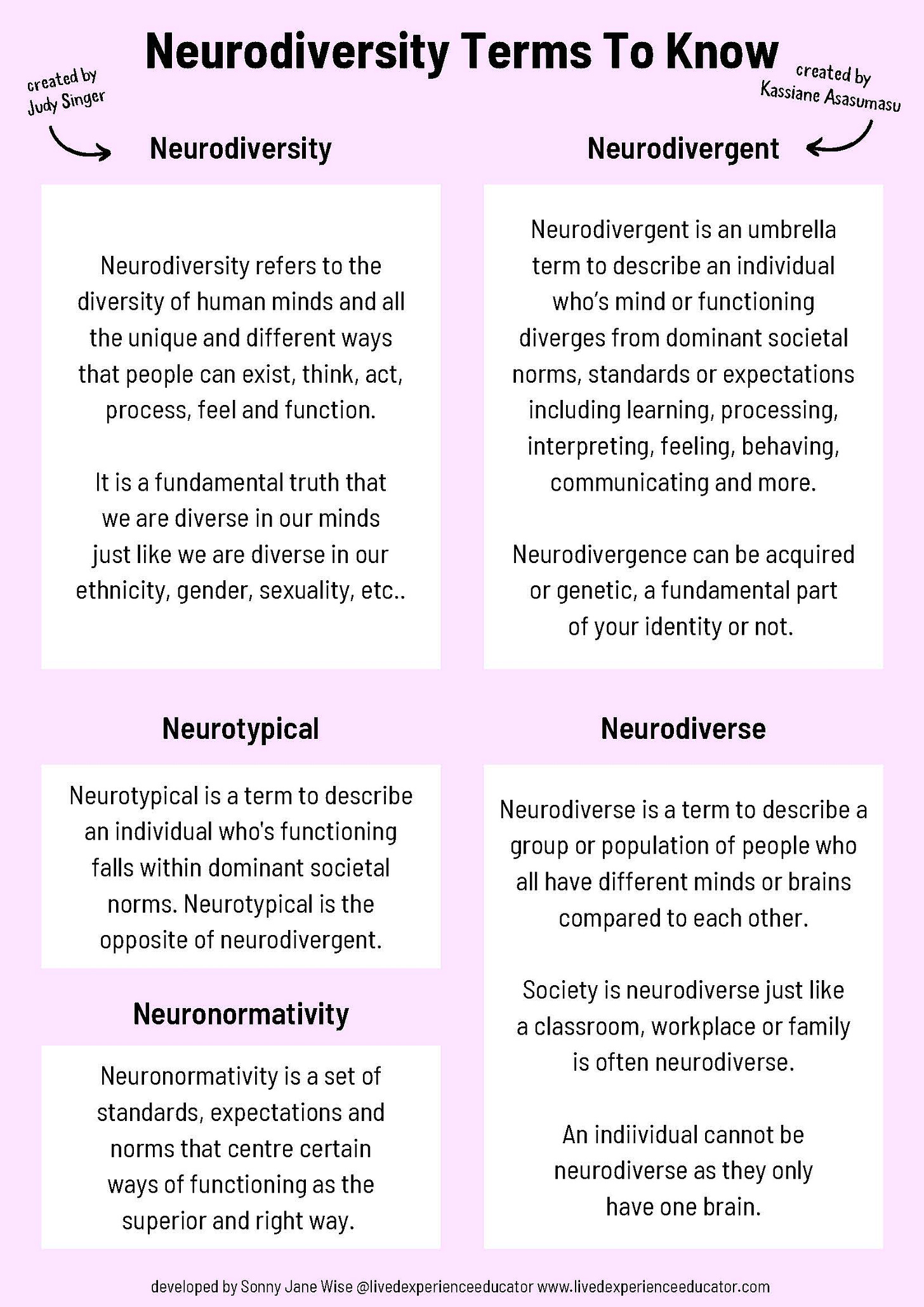Queer Resources for Neurodiversity Celebration Week
A library of resources for neuroqueer people and their allies
Commitment to intersectionality is critical to achieving impactful LGBTQIA+ inclusion. Many LGBTQIA+ people embrace a confluence of identities, including neurodivergence, an umbrella term to describe mental functioning that diverges from dominant societal norms or expectations. Also known as “neuroqueerness,” a term coined by scholars of Queer theory, LGBTQIA+ individuals who are neurodivergent must navigate systemic barriers to care, belonging, safety, and employment. Although statistics vary as to the percentage of neuroqueer people, there is an established link between the LGBTQIA+ community and neurodivergence. Some experts theorize that the link is derived from the commonality of the LGBTQIA+ community and neurodivergent people not conforming to social norms.
To uplift neuroqueer people and provide neurotypical allies with educational resources on how to best support neuroqueer individuals beyond the annual Neurodiversity Celebration Week, we have curated the following resource library. The Resource Library includes organizations whose missions assist and empower neuroqueer people, informational videos and readings on neuroqueerness, neuroqueer educators and activists to follow, and links to other resource libraries ranging from topics of neuroqueer representation in literature, and a neuroqueer language guide.
Visit ALK Consulting’s social media platforms to learn more about neuroqueerness and how the intersection of neurodivergence and LGBTQIA+ identities contributes to meaningful LGBTQIA+ inclusion efforts.
Connecting
Autistic Women & Nonbinary Network (AWN) provides community support, and resources for Autistic women, girls, transfeminine and transmasculine nonbinary people, trans people of all genders, Two Spirit people, and all people of marginalized genders or of no gender. AWN is committed to recognizing and celebrating diversity and the many intersectional experiences in our community.
The Trevor Project envisions a world where all LGBTQ+ young people see a bright future for themselves.
Twainbow recognizes that LGBTQI+ people with an Autistic diagnosis have two separate rainbows — and two separate coming out stories. There are times when an autistic will not come out as LGBTQI+, and vice-versa. The challenges for each minority group are great, and being a double-social minority can be especially tough. Education and peer support goes a long way in helping to navigate these challenges, and make for a smoother trip on the social highway. That’s the premise of Twainbow — people living under a double-rainbow.
Watching
“The Confluence of Neurodiversity and LGBTQ,” Neurodiversity Podcast, September 7, 2023.
K. Woodzick, “Intersections/Origins of Gender and Neurodiversity,” TED Talk, April 6, 2023.
“Neurodiversity Dialogues,” Cornell University, May 17, 2023
Reading
Maxfield Sparrow, ed. Spectrums: Autistic Transgender People in Their Own Words. London: Jessica Kingsley Publishers, 2020.
Sonny Jane Wise. We’re All Neurodiverse. London: Jessica Kingsley Publishers, 2024.
Nick Walker. Neuroqueer Heresies: Notes on the Neurodiversity Paradigm, Autistic Empowerment, and Postnormal Possibilities. Fort Worth, TX: Autonomous Press, 2021.
Listening
Sonny Jane Wise (they/them) is a trans, multiply neurodivergent & disabled public speaker, advocate and author.
Lydia X. Z. Brown (they/them) is a writer, public speaker, educator, trainer, consultant, advocate, community organizer, community builder, activist, scholar, and attorney and identifies as multiply disabled, queer, and a nonbinary Chinese American.
Dr. Nick Walker (she/her) is an author, educator and Professor of Psychology at the California Institute of Integral Studies, queer futurist, and transpersonal somatic psychologist whose work explores the edges and intersections of somatic psychology, transpersonal psychology, queer theory, neurodiversity, and creativity.
Learning
TransLash for Autistic trans people
LGBTQ Reads for neuroqueer representation in literature
Neuroqueer for an intersectional language guide





